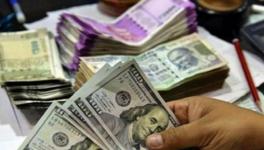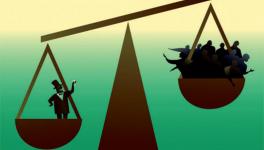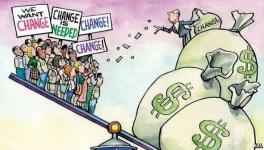World’s Shaky Economies: What Happened Before, What's Happening now
According to a report released by the World Bank on March 28, 2022, rising inflation and declining economic growth are worsening the financial situation in many countries. Russia’s invasion of Ukraine in recent weeks has added to the global economic crisis. In addition, the burden of high debt on newly established markets and developing economies could turn these risks into flames. These economies contribute 40% to the global GDP. By the time the war broke out, most of these economies were already faltering.
Over the past decade, the debt of these economies was growing, and the Covid-19 pandemic further exacerbated it. The debt has exceeded 250% of government revenues in these economies in the past 50 years. One such example is the Sri Lankan economy. Over the next year, a dozen developing economies may be unable to repay instalments of their loans and pay interest on them.
Although the situation of developing economies has been highlighted in this report of the World Bank, the condition of developed economies of the world has also become unsatisfactory. The sharply increasing prices of crude oil because of the Russia-Ukraine war, the sharply increasing prices of food products due to a significant decrease in their supply from Russia and Ukraine, and increasing house rents for the working-class people have suffocated the low-income and the middle-income people in the United States and some other developed countries. The governments of these countries gave special economic packages to the above two categories of people due to the Covid-19 pandemic. However, their demand for higher wage rates and their attainment of those, to some extent, are becoming meaningless due to the rapidly rising inflation. On the other hand, the profits of the capitalist / corporate world are skyrocketing in these countries.
It is important to highlight the various economic ideologies and business developments of the last three-four centuries before suggesting viable solutions to bring the world’s faltering economies on track and raise the living standards of the working-class people.
The classical economists were firm believers in ‘The Say’s Law of Markets’. According to this law, supply creates its own demand. As a result, there is neither oversupply of products nor mass unemployment. According to these economists, the market is the solution to all the economic problems. These economists have given prominence to the ‘Laissez Faire Policy’ that states that the government should not interfere in economic activities. This ideology of the classical economists may have seemed plausible for some time, but over time it has come under severe criticism for its false assumptions.
In the early part of the twentieth century, the opposite of ‘The Say’s Law of Markets’, began to emerge. The Great Depression of the 1930s (1929-34) completely disproved this law. During this period, many countries, except the socialist ones (which were closed economies at that time), had stocks of goods, but they had no buyers and unemployment was very high. These facts have devastated many of the world’s economies. As a result, it has become clear that the belief of classical economists that supply creates its own demand is not correct.
Many economists have come up with ideas for overcoming the Great Depression. Among these economists, J M Keynes’s work became very popular, which is found in his book, ‘The General Theory of Employment, Interest, and Money’, published in 1936. Keynes sharply criticised the views of classical economists, pointing out that the cause of the Great Depression was lower aggregate demand compared to aggregate supply. Keynes outlined the causes of the Great Depression of the 1930s, and he offered meaningful suggestions for resolving the problems. His suggestions were adopted by the governments of various countries. Keynes called for government investment in infrastructure to boost aggregate demand and suggested that the government should employ labourers who are willing to do any work, even if it is non-economic, to increase the supply of money in the economy; the work could even be digging holes on the banks of canals.
The rationale behind Keynes’s idea was that the wages paid to these labourers would be spent entirely as their “Marginal Propensity to Consume” is more than unity. To cope with the Great Depression of the 1930s, governments of various countries invested in infrastructure and provided employment to the working-class people. The implementation of Keynes’s recommendations led to the emergence of mixed economies in which public sector enterprises were established and expanded and private sector enterprises were monitored and regulated. In such economies, employment has increased and social security for the common person has been ensured. Keynes was considered one of the greatest economists of the 20th century for his role in overcoming the Great Depression of 1930s.
Over time, the capitalist economic system has not only been revived, but the corporate world has been brought forward to control the economies of most of the world’s nations. Economist Milton Friedman (1912-2006) was instrumental in advancing the capitalist / corporate world. He was assisted in this task by the economists brought forward by him at that time. From the political arena, in the 1980s, the then US President Ronald Reagan and the then British Prime Minister Margaret Thatcher made significant contributions to the growth of the capitalist / corporate world by reducing tax rates on the capitalist / corporate world and offering several other concessions. It is important to mention here that Friedman was the economic adviser to US President Ronald Reagan and British Prime Minister Margaret Thatcher.
After the Great Depression, the economies of various countries continued to fluctuate; for example, the recession between 1991 and 2001. The Great Recession of 2008 shook many countries of the world. The impact of the Great Recession in India was less than in the developed world. The main reason behind such a fact was the public ownership of the major banks of India at that time and government control and regulation over the activities of these banks.
Periodic reports on economic inequality by Oxfam and other international organisations highlight that the economic gaps between rich and poor countries and between the rich and poor, continue to widen. At the outset of the globalisation process, it was argued that globalisation would reduce such economic gaps as reducing subsidies on goods in different parts of the world would benefit the people of all the countries. The research that has been done on globalisation has revealed the fact that developed countries are undermining the economies of developing countries by giving huge subsidies to their businesses. The primary beneficiaries of globalisation have been the capitalists/corporates, and the workers have been deprived of it.
After the independence of India in 1947, the Planning Commission was set up in 1950. The Five-Year Plans were initiated in India in 1951. The priorities of these plans led to the emergence of a mixed economy in the country in which public sector entities came into existence and were expanded, and control and regulation over private sector entities were ensured. In India, the period 1951-80 is considered the planning period. During this period, employment was provided to the working-class people in the public sector enterprises in the country, due to which the labourers working in this sector received good salaries, allowances and many other facilities which raised their levels of living. The main objective of these public institutions was the welfare of the people. The products and services provided by these public institutions enhanced the welfare of the common person. During this period, the control and regulation over the country’s private sector helped prevent the profits of this sector from growing unnecessarily.
Different research studies conducted in the country have revealed that the economic gap between rich and poor has narrowed during the planning period. After 1980, planning was put in reverse gear. Since 1991, the country has embarked on “New Economic Policies” of liberalisation, privatisation, and globalisation, which continues unabated by the capitalist / corporate world. International and domestic reports highlight the growing economic gap between rich and poor.
At present, the economies of some developing countries are faltering, and the predictions of the faltering of others have emerged. Fear of recession is being expressed in the economies of some developed countries of the world. To save the world’s faltering economies and improve ordinary people's lives, it is necessary to adopt the ideology given by the economist Keynes and create mixed economies. Initially, institutions providing education, healthcare, and necessities of life can be brought into the public sector for the benefit of the people, which will increase their income, and as a result, the aggregate demand can be increased to the desired extent. At present, there is an urgent need to raise taxes on the profits of the capitalist / corporate world as is the practice in Sweden and some other developed countries.
(The author is a former Professor at the Department of Economics, Punjabi University, Patiala.
Get the latest reports & analysis with people's perspective on Protests, movements & deep analytical videos, discussions of the current affairs in your Telegram app. Subscribe to NewsClick's Telegram channel & get Real-Time updates on stories, as they get published on our website.
























